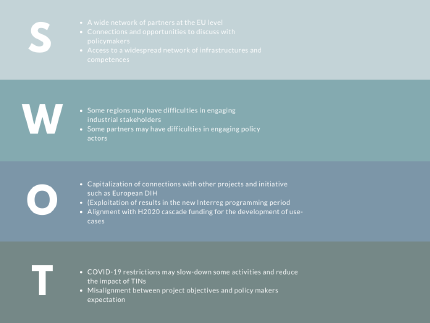Artificial Intelligence
Artificial intelligence (AI) refers to systems that display intelligent behaviour by analysing their environment and taking actions with some degree of autonomy to achieve specific goals. (European Commission)
I-based systems can be:
- Software based, acting in the virtual world (e.g. voice assistants, image analysis software, search engines, speech and face recognition systems)
- AI can be embedded in hardware devices (e.g. advanced robots, autonomous cars, drones or Internet of Things applications).
AI has a wide range of applications in diverse sectors, but the working group is going to focus mainly on manufacturing context, with the specific goal to address the most common challenges highlighted by industrial stakeholders.
SUB-TOPICS:
- Advanced Analytics: Systems that learn from data (through direct observation or instruction), identify patterns and, based on mathematical models, make decisions with minimal human intervention.
- Recognition Technologies: Recognition technologies (i.e. facial recognition, emotion recognition, object detection, image processing, NLP) are meant to improve machine learning algorithms with a variety of data coming from different sources and with increasing precision. For example, the interpretation and processing of human language used to analyse free text and extract a huge number of relevant information, is offering companies the opportunity to improve operations and services.
- Decision Management: Decision management systems has raised a number of benefits for companies allowing faster decisions, detection of risks and process automation. AI methods and techniques are increasingly being embedded in decision Support System to gather and analyse evidence, identifying and diagnosing problems, proposing possible courses of action and evaluating the proposed actions. The aim of the artificial intelligence techniques embedded in an intelligent decision support system is to enable these tasks to be performed by a computer.
- AI-enhanced hardware and robotics: Set of technologies applied to machines to automate the tasks that are repetitive and with no value added, allowing humans to focus on more conceptual and strategic activities.
WORKING GROUP MEMBERS:
LEADER: Lombardy Intelligent Factory Association
CORE MEMBER:
- Pannon Business Network Association
- Association Industry 4.0 Austria
- Krakow Technology Park
- PROFACTOR
LEARNER:
- Karlsruhe Institute of Technology
- Intelligent Integrated Systems Technology
- Pomurje Technology Park
- Croatian Agency for SMEs, Innovations and Investments
- Fraunhofer Institute for Machine Tools and Forming Technology
In order to determine the strategic orientation of the TIN, the partners analysed the strengths, weaknesses, opportunities and threats they perceive associated to the topic of Artificial Intelligence, their organisation and the working partnership.

